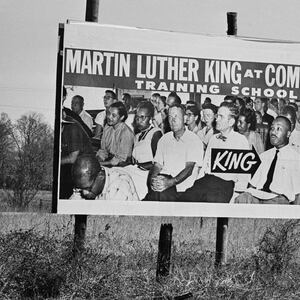Notorious Black historian Alex Haley faked Dr. Martin Luther King Jr.’s harsh criticism of Malcolm X, playing up their infamous rivalry, a biographer has found.
In fact, Jonathan Eig found that King respected X’s sentiments—far different from previous beliefs that King felt X was “fiery” and “demagogic.”
“We’ve been teaching people for decades, for generations, that King had this harsh criticism of Malcolm X,” Eig told The Washington Post, “and it’s just not true.”
While researching King at Duke University for an upcoming biography, Eig found an unedited transcript of the interview between the civil rights leader and Haley, according to The Post.

Martin Luther King Jnr and Malcolm X pictured in 1964.
Marion S.Trikoskor/Universal History Archive/Getty ImagesIn the 1965 interview for Playboy magazine, Haley, who later interviewed X as the ghostwriter for his autobiography The Autobiography of Malcolm X: As Told to Alex Haley, asked King how he felt about X’s fight for civil rights and criticism of nonviolence.
“I totally disagree with many of his political and philosophical views, as I understand them,” King said, according to the transcript Eig found. “I don’t want to seem to sound as if I feel so self-righteous, or absolutist, that I think I have the only truth, the only way. Maybe he does have some of the answer. But I know that I have so often felt that I wished that he would talk less of violence, because I don’t think that violence can solve our problem. And in his litany of expressing the despair of the Negro, without offering a positive, creative approach, I think that he falls into a rut sometimes.”
However, Haley’s article in Playboy included a quote that Eig didn’t find anywhere in the transcript in which King also said, “I feel that Malcolm has done himself and our people a great disservice.”
Haley’s article also included King’s infamous quote about X: “Fiery, demagogic oratory in the black ghettos, urging Negroes to arm themselves and prepare to engage in violence, as [X] has done, can reap nothing but grief.” But Eig found that the quote was taken completely out of context from a question about extremists in general, not specifically X.
The ethical and journalistic blunder brings Haley’s other work into question, including alleged falsehoods in his famous generational saga Roots.
While Eig said King was more “radical” than people appear to remember, he was also more understanding of other approaches toward equality.
“[King] was a Christian radical, and his radicalism came from a different place than Malcolm’s did, but they always had a lot in common,” Eig told the Post. “They always believed that you had to take radical steps to change America, to end racism, to create a country that lived up to the words of its promises.”






